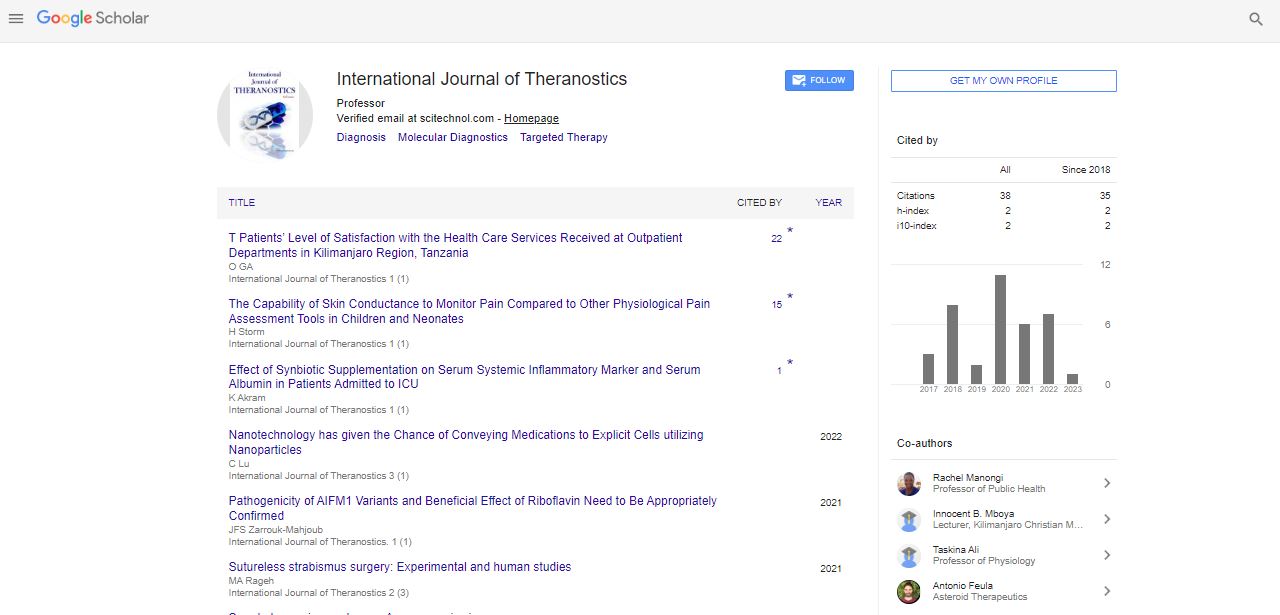Opinion Article, Int J Theranostic Vol: 12 Issue: 4
Exosomes in Theranostics: Diagnostic Markers and Therapeutic Delivery Vehicles
Kwan Huai*
1Department of Biomedical Engineering, University of Hong Kong, Tat Chee, China
*Corresponding Author: Kwan Huai,
Department of Biomedical Engineering,
University of Hong Kong, Tat Chee, China
E-mail: Huaikwai996876@cuhgbe.hk
Received date: 27 November, 2023, Manuscript No. IJT-23-124066;
Editor assigned date: 29 November, 2023, PreQC No. IJT-23-124066 (PQ);
Reviewed date: 14 December, 2023, QC No. IJT-23-124066;
Revised date: 21 December, 2023, Manuscript No. IJT-23-124066 (R);
Published date: 28 December, 2023, DOI: 10.4172/IJT.1000147.
Citation: Huai K (2023) Exosomes in Theranostics: Diagnostic Markers and Therapeutic Delivery Vehicles. Int J Theranostic 12:5.
Description
In recent years, exosomes have emerged as key players in the field of theranostics, representing a bridge between diagnostics and therapeutics. These small extracellular vesicles, secreted by various cell types, carry a cargo of proteins, nucleic acids, and lipids that reflect the physiological or pathological state of their cell of origin. This essay explores the potential of exosomes as diagnostic markers and delivery vehicles for therapeutic agents in theranostics, highlighting their versatile role in revolutionizing personalized medicine.
Exosomes are nanosized vesicles (30-150 nm) derived from the endosomal system and released by cells into the extracellular environment. They play a crucial role in intercellular communication by transferring bioactive molecules between cells. The cargo of exosomes includes proteins, lipids, and various forms of nucleic acids, such as mRNA, miRNA, and DNA. This unique composition makes exosomes attractive candidates for both diagnostic and therapeutic applications.
Exosomes carry a diverse range of biomolecules reflective of their cell of origin. By analyzing the contents of exosomes, researchers can identify specific biomarkers associated with various diseases, including cancer, neurodegenerative disorders, and cardiovascular diseases. This enables the development of minimally invasive diagnostic tests that capitalize on the accessibility of exosomes in bodily fluids such as blood, urine, and saliva. In the realm of oncology, exosomes have shown significant promise as diagnostic markers. Tumor-derived exosomes carry unique molecular signatures, including mutated oncogenes and specific proteins, providing valuable information about the type and stage of cancer. Liquid biopsies based on exosomal cargo offer a non-invasive method for cancer detection, monitoring treatment response, and assessing the risk of recurrence.
Exosomes derived from neural cells can serve as diagnostic indicators for neurodegenerative diseases. Specific proteins and nucleic acids found in neuronal exosomes may act as biomarkers for conditions like Alzheimer's and Parkinson's disease. The ability to detect these biomarkers in cerebrospinal fluid or blood opens avenues for early diagnosis and monitoring disease progression.
Exosomes released by cardiac cells contain biomolecules that reflect the health status of the cardiovascular system. Analysis of exosomal cargo can provide insights into conditions such as myocardial infarction, heart failure, and atherosclerosis. Utilizing exosomes as diagnostic markers in cardiovascular diseases holds promise for early detection and risk assessment.
Exosomes possess a natural ability to target specific cell types due to the presence of surface proteins that facilitate binding to recipient cells. This intrinsic targeting capability makes exosomes attractive as vehicles for delivering therapeutic agents. Loading exosomes with drugs, small molecules, or nucleic acids allows for precise and efficient delivery to the target cells, minimizing off-target effects. The delivery of RNA-based therapeutics, such as small interfering RNA (siRNA) or microRNA (miRNA), faces challenges related to stability and efficient uptake by target cells. Exosomes, with their protective lipid bilayer, offer a solution to these challenges. Engineered exosomes can be loaded with RNA therapeutics, providing a stable and efficient means of delivering these agents to specific tissues or organs.
The revolutionary CRISPR-Cas9 gene editing system can be harnessed for therapeutic purposes, but efficient and targeted delivery of CRISPR components remains a challenge. Exosomes, with their ability to traverse biological barriers and deliver cargo to specific cells, hold promise as carriers for CRISPR components, facilitating precise gene editing for therapeutic purposes. Exosomes play a role in tissue repair and regeneration by promoting cell proliferation, angiogenesis, and modulating the immune response. Loading exosomes with regenerative factors enhances their therapeutic potential for conditions such as tissue injury, degenerative disorders, and organ transplantation. Exosome-based therapies offer a natural and versatile approach to promoting tissue regeneration.
Despite the immense potential of exosomes in theranostics, several challenges need to be addressed. Standardization of isolation and purification methods, as well as the development of robust characterization techniques, is essential to ensure the reproducibility and reliability of exosomal diagnostics. Additionally, optimizing the loading capacity and release kinetics of therapeutic cargo in exosomes is crucial for maximizing their therapeutic efficacy.
The ethical considerations of manipulating exosomes for therapeutic purposes also warrant careful examination. Balancing the potential benefits of exosome-based therapies with concerns related to safety, unintended consequences, and long-term effects is essential for responsible development and implementation.
 Spanish
Spanish  Chinese
Chinese  Russian
Russian  German
German  French
French  Japanese
Japanese  Portuguese
Portuguese  Hindi
Hindi 